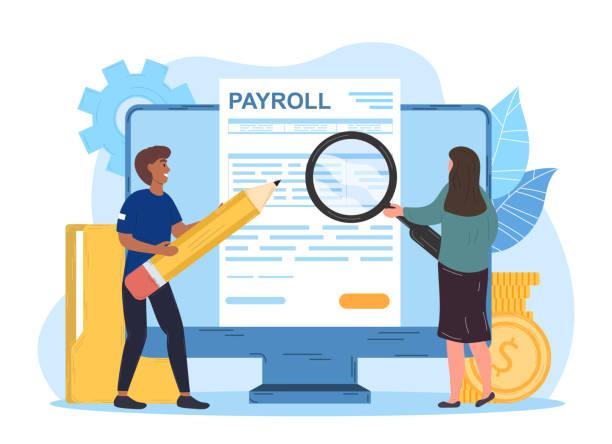Payroll management is a critical function for businesses across all industries. It involves calculating employee wages, withholding taxes, and ensuring compliance with legal requirements. However, navigating payroll compliance can be complex, especially considering the ever-changing landscape of employment laws and regulations. This article will discuss the essential aspects of payroll for all industries and provide actionable tips to ensure accuracy and meet legal requirements.

Understanding the Importance of Payroll Compliance
Payroll compliance refers to adhering to laws and regulations related to paying employees accurately, withholding and remitting taxes, and maintaining accurate records. It is crucial for businesses to prioritise payroll compliance for the following reasons:
- Legal Obligations: Compliance with payroll laws ensures that companies fulfil their legal obligations, avoiding penalties, fines, and legal disputes.
- Employee Trust and Satisfaction: Accurate and timely payroll processing builds trust and enhances employee satisfaction, fostering a positive work environment.
- Government Reporting: Compliance enables businesses to fulfil their reporting requirements to government agencies accurately and on time.
- Financial Management: Compliant payroll practices ensure accurate financial records, facilitating budgeting, forecasting, and financial decision-making.
Essential Aspects of Payroll Compliance
- Classification of Employees
- Correctly classify employees as either employees or independent contractors based on legal guidelines.
- Understanding the criteria for employee classification is essential to ensure compliance with wage and the hour laws, benefits eligibility, and tax obligations.
- Accurate Employee Records
- Maintained up-to-date and objective employee records, including personal information, tax forms, and employment contracts.
- Regularly review and update employee records to reflect any changes in employment status, wages, or benefits.
- Wage and Hour Compliance
- Guarantee adherence to wage and hour regulations, which encompass the minimum wage, overtime pay, and the provision of meal and rest breaks.
- Keep track of employee work hours and implement a reliable timekeeping system to calculate wages accurately.
- Tax Withholding and Reporting
- Withhold the correct federal, state, and local taxes from employee wages.
- Timely remit payroll taxes to the appropriate tax authorities, file accurate tax returns and report employee wages.
- Benefits Administration
- Comply with laws related to employee benefits, such as providing required benefits and administering them correctly.
- Stay updated on benefits regulation changes, including healthcare coverage, retirement plans, and leave policies.
- Recordkeeping and Documentation
- Maintained comprehensive payroll records, including pay stubs, timesheets, tax forms, and employment contracts.
- Store records securely and retain them for the required duration to ensure compliance with recordkeeping laws.
- Compliance with Employment Laws
- Stay informed about employment laws and regulations that impact payroll, such as anti-discrimination laws, family and medical leave, and disability accommodations.
- Implement policies and practices that comply with these laws to avoid legal issues and maintain a fair and inclusive work environment.
- Audits and Internal Controls
- Regularly conduct internal audits of payroll processes and records to identify errors, discrepancies, or potential compliance issues.
- Implement internal controls, such as the segregation of duties and approval processes, to prevent fraud and ensure accuracy in payroll operations.
Tips for Ensuring Payroll Compliance
- Stay Informed
- Stay updated on changes in employment laws and regulations, subscribe to relevant newsletters, attend seminars, or consult legal experts.
- Regularly review government websites and resources for information on payroll compliance requirements specific to your industry.
- Invest in Payroll Software
- Utilise reliable payroll software that automates payroll calculations, tax withholding, and reporting.
- Choose software that keeps up with changing laws and provides regular updates to ensure compliance.
- Seek Professional Assistance
- Consider working with a payroll specialist, accountant, or HR consultant to ensure payroll compliance.
- Their expertise can help you navigate complex regulations and provide guidance on specific industry requirements.
- Training and Education
- Provide training to payroll staff on payroll compliance requirements and best practices.
- Stay informed about professional development opportunities for your payroll team to enhance their knowledge and skills.
- Regular Reviews and Audits
- Conduct periodic payroll processes and records reviews to identify and address any compliance issues.
- Engage internal or external auditors to perform independent audits and identify areas for improvement.
Maintain Clear Communication Channels
Establish open lines of communication with employees to address any questions or concerns related to payroll compliance. Create a designated point of contact or a dedicated email address where employees can reach out for payroll-related inquiries. Promptly respond to employee queries and provide clear and accurate information to ensure transparency and foster trust.
Utilise Compliance Checklists
Develop comprehensive compliance checklists that cover all relevant payroll-related requirements specific to your industry and jurisdiction. Regularly review and update these checklists to ensure they reflect the latest legal and regulatory changes. Use these checklists as a guide to ensure you’re meeting all necessary compliance obligations.
Monitor Legislative Updates
Stay abreast of legislative updates and changes in employment laws that could impact payroll compliance. Review government websites and industry publications regularly, or consult legal experts to understand any new regulations or amendments. Proactively monitoring and understanding changes allows you to adapt your payroll processes accordingly and maintain compliance.
By implementing these additional tips, businesses can further strengthen their payroll compliance efforts. Clear communication, ongoing training, regular audits, compliance checklists, and staying informed about legislative updates contribute to accurate and compliant payroll processes. Payroll compliance is not a one-time task; it requires ongoing attention and diligence to ensure the proper and legal management of employee wages and related obligations.
Payroll for all industries and its compliance is a critical responsibility for businesses. By prioritising payroll compliance, companies can avoid legal consequences, maintain accurate financial records, and foster a positive work environment. Understanding the essential aspects of payroll compliance, investing in payroll solutions, staying informed, and seeking professional assistance are key strategies to ensure accuracy and meet legal requirements. By implementing these practices, businesses can streamline their payroll processes, reduce compliance risks, and focus on their core operations with confidence.
















